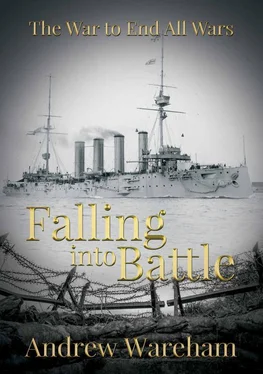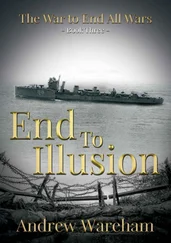“Thank you, sir. I don’t know that I ought to go back to Bedford, sir. We may need every man here. Could not my men be sent to me, sir?”
“No, they could not. There is a good reason why you must go to England, Baker. Not surprised to hear that you want to stay where the fighting is, but you can be spared for a few days.”
The staff officer was laughing, shaking his head.
“You have done your share for a week or two, Baker. Sit back and relax for a while, sir. The war won’t go away, you know!”
The general was smiling too, turned to his own people making some comment about ‘young fire eaters’.
Richard was led to a camp bed, fell upon it, dropping off to sleep almost instantly, time enough just for the final thought that he seemed to have come out smelling of violets.
The morning saw a massive breakfast – the general’s normal meal – and a red double-decker London bus parked outside the mess tent.
“Whatever is that doing here, sir?”
“Sent across last month, my boy! Did sterling service at the Marne. You won’t have heard but the Germans were stopped dead and then pushed back well clear of Paris. Put an end to the Schlieffen Plan – ‘stopped their farting in chapel’, as the men say!”
“Oh, that’s good, sir. I wish I had been there!”
Again, he had found the right thing to say.
“You did well where you were, Mr Baker. Off you go, now, board your bus. Your men are waiting for you. I am proud to have met you, sir.”
The general held out a hand to shake, a great condescension from so superior a rank.
The bus crawled over bumpy dirt roads and took almost an hour to reach the Bedfordshires in their camp. The thin battalion paraded as the bus came in sight and Colonel Braithwaite saluted as they disembarked.
“Battalion, attention!”
Richard drew himself upright, acknowledging the honour done to him and his company.
“D Company to the right of the line, Mr Baker. The place of honour.”
It was all very flattering. Sergeant Grace marched the tiny company to the right and located them precisely with much bellowing of commands, as was proper on the parade ground.
“Mr Baker, front and centre!”
“Sir!”
Richard marched out to stand in front of his colonel.
“By order of the General Commanding, you are promoted to substantive captain of D Company, Mr Baker.”
Richard had hoped that he might receive brevet rank; substantive was a bonus.
“Sir!”
He exchanged salutes with the colonel.
“Captain Baker, I have the honour to inform you that you have been awarded the Victoria Cross for repeated acts of gallantry in the field. You will return to London, to Buckingham Palace for the investiture.”
That was wholly unexpected.
The colonel saluted Richard and he responded, mind busy with the implications of the greatest honour. His father would have to change his tune now!
“About face, Captain Baker.”
He obeyed, automatically, realised that the battalion was presenting arms to him, an unheard of honour for a junior officer. He came to the salute in response, hoping that was correct.
The parade dismissed and the colonel led him into the mess.
“You are one of us, of course, Baker. Permanent commission in the regiment. The Colonel of the Regiment has sent his congratulations – the Duke of Bedford, that is, naturally.”
The Colonel of a regiment occupied an honorary position, had no role in the chain of command.
“I am honoured, sir.”
“As are we, Baker. Come now, time for a celebratory Scotch before we must send you off to Calais and the boat. Your servant will put your ribbon up on your tunic – your award is immediate. Best thing is to go to London, to your tailors - Gieves is best – and then to your home. Report to the depot for Monday morning, and you will be transported to London for Tuesday and the investiture. After that, you can have two more days in the depot and return on Friday of next week.”
“Yes, sir. Ah… what day is it today, sir? Lost count, being rather busy.”
“Tuesday, Baker. Come now, your glass, sir.”
Lieutenant-Colonel Braithwaite turned to the mess, all of its officers in an arc around the pair.
“Gentlemen! Captain Baker, VC!”
They drank and cheered, three formal hurrahs.
A batman appeared at the door carrying a tunic.
“Change your coat, Baker!”
Richard walked across, embarrassed, thinking the performance excessive, and put on the captain’s tunic with the single piece of scarlet ribbon on the breast. The officers cheered again and refilled their glasses.
“Transport for you, Baker – the officers will make a day of this – a great honour for the Third Battalion, its first, being a new formation.”
The colonel escorted Richard out.
“By the way, sir, have you heard anything of Second Lieutenant Smithers? He was with a party of walking wounded I know.”
“Not a thing, Baker. No record of his getting back and haven’t heard his name through the Red Cross as a prisoner. Missing, believed dead, I suspect.”
“For the best, sir. His parents are better served that way. So is the Regiment.”
“Agreed. It saves me having to put him to a court. We should be able to keep it quiet.”
“As a Terrier I would very much like to, sir, though I doubt it to be possible. Some of my men saw what happened; they will never keep their mouths shut. He ran and was seen to do so.”
“He is better simply dead than put before a firing squad. We can keep that story very quiet – should be able to make sure it is not heard outside the battalion. A word to the sergeant-major and he may be able to silence the men. I shall see to that. Off you go now!”
There was a wagon waiting to take Richard to the quays – motor vehicles were in short supply and few were available other than for the staff.
The quayside was a mess of stacks of crates and cartons and men coming in from England and wounded on stretchers waiting to go out. Every space along the wharves had a ship tied up and cranes busy. The roads leading away were jammed, showed no signs of overall organisation.
Richard’s wagon was stopped by a detachment of military police.
“Walk from here, sir. No space for passenger carts. Papers, sir?”
The driver produced documentation. The redcap glanced at the covering note and then at Richard’s chest and froze into a salute.
“Sorry, sir. Didn’t see, sir. Been on duty twelve hours straight, sir. You’ll still have to walk, sir – be faster than trying to drive through that mess. The ferry, down at the end of the quays, sir… Not that you can see. One moment, sir. Sergeant!”
An older redcap turned at the private’s shout, instantly spotted the ribbon on Richard’s chest.
“Sir!”
He glanced at the papers.
“Private Smith will escort you to your ship, sir. He can carry your baggage, sir.”
“None, Sergeant. Lost the lot!”
“Very good, sir.”
Another salute and the Sergeant nodded to the private.
There was a guard on the ferry’s brow. They looked at Richard’s papers, as they must, but delayed him only seconds, waving to a steward waiting on board for important personages.
“Captain Baker, sir? Oh, yes, sir. First class saloon for you, sir. This way, sir.”
Richard was sat down in a luxurious cabin with tables for no more than a score of passengers, evidently the ultimate in privileged travel in days of peace. There was a brigadier and a lieutenant-general, each with three staff officers, already ensconced; they scowled at the presence of a mere captain until a staff officer spotted the ribbon and gave them the nod. They stood to the salute, Richard responding in surprise, remembering then the rule that the VC was always saluted first.
Читать дальше












